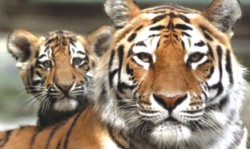|
Postscript
The Empathy Factor
Aasha Mehreen Amin
 An AFP report on May 25 in The Daily Star says that even animals have an innate sense of empathy and help other animals that are in distress. This was concluded by research findings of Professor Marc Behoff, an ecologist at the university of Colorado, Boulder and major animal lover, who says that morals are 'hard-wired' into the brains of all mammals and provide the 'glue' that allow even aggressive and competitive animals to live in groups. An AFP report on May 25 in The Daily Star says that even animals have an innate sense of empathy and help other animals that are in distress. This was concluded by research findings of Professor Marc Behoff, an ecologist at the university of Colorado, Boulder and major animal lover, who says that morals are 'hard-wired' into the brains of all mammals and provide the 'glue' that allow even aggressive and competitive animals to live in groups.
There are many examples of humans (the higher mammals as we would insist on calling ourselves) getting together for the common good of the community. In Kazipur upazilla, recently, five thousand people -- men, women and children joined hands to build a 4 km road in their locality. Without this road the people could not go to the hospital, children could not go to school, farmers could not get proper market price for their rice and produce. Thus with that magic word 'empathy' (plus some help from Care, Bangladesh) humans did what they are apparently programmed to do: help each other.
This is hardly an uncommon phenomenon for Bangladeshis who generally extend a helping hand, provided that they know the person (which is quite easy as everyone in Bangladesh is related to each other).
So isn't it disturbing when we must witness the total suppression of this instinct and its replacement with such base instincts like 'greed', 'selfishness' and 'cruelty'. These are anomalies of basic human nature which is usually inclined towards nobler attributes, at least that's what we would like to believe. Unfortunately many of these nasty urges can be categorised as learnt behaviour, learnt from others in position of higher authority or status - one's parents, grandparents, bosses, leaders of society and so on.
When people we are supposed to look up to act unscrupulously and selfishly, it is only natural that some of it will rub off on us. So when a Member of Parliament is caught stealing from state coiffeurs -fattened by taxpayers money, to pay for his monthly grocery or perhaps a little vacation in some island called 'Suki Mi' the public may feel a tad enraged but many a cynic will resign themselves with the notion: that's what a government job is all about.
When the local mastaan who insists on putting 'Haji' before his name on a placard that states his ownership of parts of a riverbed what are the 'little people' supposed to do? Encroachment is perhaps the best example to show how far away we have strayed from our basic instinct of empathy. Humans have taken over water bodies, parks, and roads to build luxury apartments and office high rises that will bring unbelievable wealth for themselves and their progeny. And how will this affect the community around them? The community will have to deal with more and worse water-logging, diseases caused by these unnatural disasters, denuding of the greenery that give relief from the heat and pollution (not to mention oxygen), more impossible traffic congestion, more misery.
People who have committed such crimes against their fellow species include politicians, officers of the state, businessmen with great political backing (meaning huge bribing capability) and taking their cue are the smaller fry of sycophants who promptly ape their masters as best they can. These individuals are the most respected in society; they get the maximum number of salaams (many get the maximum amount of salaami too).
Here's another conundrum. We beat to a pulp, a petty thief who has snatched someone's wallet. Here empathy has a twisted ramification - it is towards the frenzied mob that has the right to lynch the person they think has transgressed. Sometimes passers-by don't even bother to find out whether the person being beaten up is actually a thief, they just go with the flow and contribute with a few slaps, kicks and punches.
But when it comes to those high-profile robbers who have literally stolen huge pieces of public land and water bodies turning our cities into concrete hells, we do little more than shake our heads and sigh ' what this world has come to!'. Meanwhile, the perpetrators of the crime have lost their natural instinct of 'empathy'. They have become 'territorial' and 'predatory' instead - instincts attributed strictly to animals that are genetically predisposed that way. The prey-that is the public, is powerless, timid and completely at the mercy of their predators who will most likely tear their lives to pieces.
So if we go back to the study of mammalian empathy and the continuous depletion of it in our society, it seems that animals are actually far more humane than humans.
.Copyright
(R) thedailystar.net 2009
|

